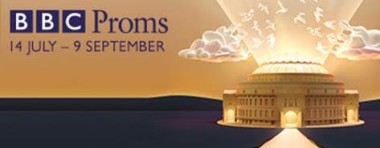
 United Kingdom 2017 BBC PROMS 40 – Brahms, Berg, Larcher, Schumann: Christian Tetzlaff (violin); Scottish Chamber Orchestra / Robin Ticciati (conductor). Royal Albert Hall, London, 15.8.2017. (CC)
United Kingdom 2017 BBC PROMS 40 – Brahms, Berg, Larcher, Schumann: Christian Tetzlaff (violin); Scottish Chamber Orchestra / Robin Ticciati (conductor). Royal Albert Hall, London, 15.8.2017. (CC)

Brahms –Tragic Overture
Berg – Violin Concerto
Thomas Larcher – Nocturne – Insomnia (UK premiere)
Schumann – Symphony No.3 in E-flat major (Rhenish)
It is good to see the Scottish Chamber Orchestra in fine form under its Music Director since 2009, Robin Ticciati. Back in 2012, Ticciati brought a sparkling Figaro; hopes are high for his Glyndebourne Clemenza, which will form Prom 59 this year. He clearly has an ear for orchestral detail, a talent that brought many revelatory touches to this Prom with the SCO.
This was, in fact, the first of two Proms in one evening: and, despite its Austro-Germanic bias, a nicely varied one at that. Despite the occasional rough edge of ensemble, the Brahms Tragic Overture emerged as powerful, well-drilled and fluid. Antiphonal violins worked well in Brahms’ counterpoint; a reedy oboe added tang to the timbral palette. The whole performance spoke of seriousness of intent; a seriousness that bled into Berg’s magnificent Violin Concerto.
Hamburg-born violinist Christian Tetzlaff was the sensitive soloist in this most elegiac of concertos, a heartfelt memorial to Manon Gropius, who died at the age of 18 and who inspired the concerto’s subtitle, “To the memory of an angel”. The arpeggio-like exchanges between soloist and orchestra that open the concerto were exquisitely managed. The subtle remembrances of dance as well as Carpathian folk music were beautifully realised; Tetzlaff’s control of high harmonics underlined just how effective a sensitive approach to this piece can be.
Perhaps the orchestral crescendi in the opening statements of the Hauptrhythmus that dominates the concerto’s second panel were a touch underplayed – including from the timpani – but that seemed in accord with the generally lyrical approach of this reading, an aspect that reached its apotheosis in the miraculous arrival of the Bach chorale melody in solo violin (beautifully resonant from Tetzlaff) and its subsequent statement from the woodwind choir. While this wind statement can sound effective when the section attempts to imitate an organ, that was less the aim here – it was more offering another expressive aspect. The supremely creamy trombone statement of the chorale theme from Duncan Wilson seemed perfectly in keeping. Care had clearly been lavished on the final bars, with Tetzlaff sustaining his note at the top of his register superbly, above creamy, perfectly balanced brass chords. A simply lovely performance. Perhaps the Late Night Prom on the horizon vetoed an encore, for none was offered.
Last year, Austrian composer Thomas Larcher’s Second Symphony featured in a Prom conducted by Bychkov (Prom 57 last season with the BBC SO: review). There, his references to tonality was noted as a part of the process of his piece; here, the in the UK premiere of Nocturne – Insomnia, a 2009 piece, Larcher paints a registral “arc” (his term) from the lowest instruments through to the highest before the work’s second panel presents a “completely restless entity” (again, Larcher); the link there to insomnia is clear enough. This piece felt much more based on tonal references than the symphony last year; using a chamber ensemble including accordion, marimba, Indian drum, prepared piano (occasionally played both by the pianist and with the piano strings plucked and strummed by a percussionist simultaneously), strings and wind, Larcher writes expressively and imaginatively, creating a slightly otherworldly soundscape. The frenzied, gnawing textures of the second part are particularly memorable. The performance, well-controlled and replete with concentration, could hardly have done more for Larcher’s music.
If there was a planned trajectory from Brahms through Berg to Larcher, it was back to the Romantic period for the closing item, Schumann’s magnificent ‘Rhenish’ Symphony (which arrived after a protracted stage rearrangement).
Quite why the ‘Rhenish’ does not get more outings is completely beyond me. Fresh, varied and presenting music of wonderful dignity (the solemn fourth movement, inspired by Cologne Cathedral), it breathes life. True, in the performance, as in the Brahms, ensemble was not always spot-on; more notable perhaps was the chamber approach, allowing Schumann’s textures, and often luminous textures at that, to shine through, in the second movement Intermezzo particularly. All praise in that Intermezzo for the agility of the SCO’s principal horn, Alec Frank-Gimmell.
A fleet and light ‘Rhenish’ – no slowing for the final brass peroration in the last movement, for example – this was bracing Schumann, and a real tonic at that.
Colin Clarke